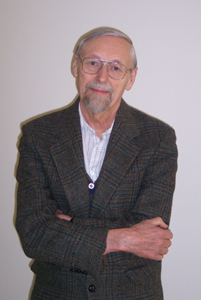From Engineering to Psychology
What do engineering and psychology have in
common? John Beeckmans.
Like many retired
professors, John Beeckmans who was a Western Engineering faculty
member, is still conducting research at The University of Western
Ontario. The only difference is his current research has nothing to
do with his 38 years of research in chemical engineering.
“I realized almost 50 years
ago, that consciousness was a mystery that science could not even
begin to explain,” says Beeckmans. “I decided then that I would
study it seriously upon my retirement.” And studying consciousness
seriously is just what he has done.
Immediately after retiring
in 1995, Beeckmans started to explore the study of consciousness.
By 1999 he had advanced sufficiently to have a paper accepted for
presentation at the Association for the Scientific Study of
Consciousness (ASSC) conference held at Western.
This year Beeckmans
presented a paper at the conference “Toward a science of
consciousness” held in Tucson, Arizona, and published a journal
article, “Chromatically rich phenomenal percepts” in the journal
Philosophical Psychology. The paper discusses the nature of sensory
experiences evoked by chromatically detailed images. “It is an
honour to have my paper published,” says Beeckmans. “Not many people
with no credentials get papers published in a professional journal.”
Having no credentials was a
hard thing for Beeckmans to get used to. During his 38-year career
in engineering he was known internationally for his research in
fluidization which led to the development of a dry coal cleaning
technology that is currently in use in three plants in Chinese coal
mines.
Beeckmans was also very
successful at the university level. In 1998 he founded the Western
Engineering Integrated Engineering program and in 1991 he co-founded
the Modular Program, a graduate course-work program for engineers in
industry that was subsequently phased out in favour of the ADMI
(Advanced Design & Manufacturing Institute) program, a cooperative
initiative involving four other Ontario universities. Beeckmans
still represents Western at ADMI program committee meetings.
The question still
remains - why did Beeckmans choose engineering as a profession?
“In the 60s I couldn’t have
made a living working on consciousness,” explains Beeckmans. “The
study of consciousness has become a respectable field of study for
science only within the past 20 years or so.”
So, as a young man,
Beeckmans decided to enter the field of engineering because he
always liked mathematics and engineering was a profession with good
career prospects. Little did Beeckmans suspect that choosing a
career in engineering would also benefit his goal to pursue the
study of consciousness after retirement.
“Perceptual psychology is a
form of reverse engineering,” explains Beeckmans. “In reverse
engineering an engineer studies an existing system and tries to
figure out how it works. Likewise, in doing research in perceptual
psychology, we do experiments using people and try to figure out the
architecture of the mind.”
Beeckmans’ story just goes
to show that engineering is a field of study that can open the doors
to many opportunities. Beeckmans, for example, took the
problem-solving skills he learned throughout his many years as an
engineer and applied them to his other areas of interest. Many
young engineers of today plan to do the same and with Western
Engineering’s numerous concurrent degree programs and research
opportunities, engineers could end up just about anywhere, doing
just about anything. Just like John Beeckmans.
